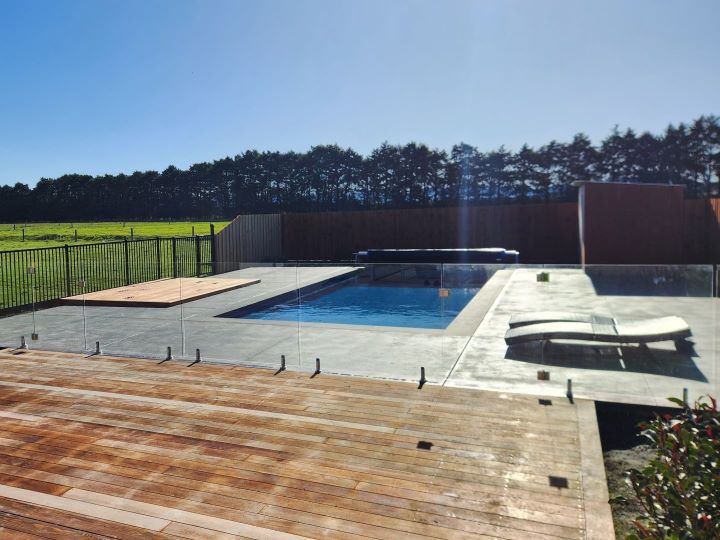Glass pool fencing is popular for homeowners seeking a modern, stylish, and unobtrusive barrier around their pools. The sleek and minimalist design offers uninterrupted views of the pool area while maintaining safety and compliance with local regulations.
However, the very features that make glass fencing appealing—its transparency and sheen—also mean it requires regular maintenance. Without proper care, the panels can become cloudy, streaked, or stained, diminishing the aesthetic appeal and compromising safety.
Regular upkeep is essential not only for keeping the glass pristine but also for ensuring the durability of the fencing materials over time.
Why Regular Maintenance Matters
A well-maintained glass pool fence serves both functional and aesthetic purposes. One primary reason for regular maintenance is to prevent the buildup of grime, dirt, and hard water stains. Over time, splashes from pool water, dust, and other environmental factors can create unsightly marks and films on the glass. This not only detracts from the clean, modern look but can also lead to permanent staining if left unattended.
Additionally, maintaining clear glass is vital for safety. Cloudy or dirty panels can obscure visibility, making it harder to monitor children or pets near the pool. Clear fencing ensures you have an unobstructed view, allowing for quick responses in case of emergencies.
Regular maintenance also prolongs the lifespan of the fencing and its hardware. Dirt and moisture can cause corrosion on hinges and latches, leading to costly repairs or replacements. By investing time in upkeep, you protect your investment and ensure it remains functional and attractive for years.
Tools and Supplies You’ll Need
Having the right tools and supplies is essential for effective cleaning. For routine maintenance, start with a few basics:
- Microfibre Cloths: These are gentle on the glass and effectively remove dirt and smudges without scratching the surface.
- Non-Abrasive Glass Cleaner: Choose a product specifically designed for glass, or opt for a homemade solution like a mix of vinegar and water. These cleaners cut through grime without leaving streaks.
- Soft-Bristle Brush: Ideal for removing stubborn dirt or cleaning around the edges of the panels without causing scratches.
- Hose or Bucket of Water: Clean water is crucial for rinsing away residue after cleaning.
For deeper cleaning sessions, consider optional tools like a squeegee to prevent water spots during drying and commercial glass coating products to add a protective layer. These coatings make it harder for dirt and water to adhere to the glass, reducing the frequency of cleaning.

Step-by-Step Cleaning Process
Preparation
Before you begin, clear the area around the pool fence. Remove leaves, debris, and anything else that could interfere with cleaning. Take a moment to inspect the glass panels and hardware for any visible damage, such as cracks, chips, or rust. Addressing these issues early can prevent more significant problems down the line.
Basic Cleaning
Start by spraying the glass panels with a non-abrasive glass cleaner or a homemade vinegar solution. Avoid harsh chemicals that could damage the glass or surrounding surfaces. Using a microfibre cloth, gently wipe the panels in a circular motion to remove dirt, fingerprints, and smudges. Pay special attention to the edges and corners, where grime accumulates.
Tackling Hard Water Stains
Hard water stains are common on pool fencing due to frequent exposure to splashing water. To remove these, apply a vinegar solution to the affected areas and let it sit for a few minutes. This will help dissolve the mineral deposits. Use a soft-bristle brush to gently scrub the stains, not scratching the glass.
Rinsing and Drying
After cleaning, rinse the panels thoroughly with clean water to remove any remaining cleaner or vinegar solution. Use a hose for convenience or a bucket if the area isn’t accessible. Finally, dry the glass with a squeegee or a clean cloth to prevent water spots from forming.
Maintaining the Hardware
Glass pool fencing isn’t just about the panels; the hardware plays a crucial role in its functionality. Regularly check hinges, latches, and other fixtures for signs of rust or wear. Rust can compromise the strength and appearance of the hardware, while worn hinges or latches can affect the fence’s safety.
To keep moving parts operating smoothly, apply a small amount of lubricant to hinges and latches as needed. This prevents squeaking and ensures the gate opens and closes without difficulty. For metal components, clean them periodically with a mild detergent and water to remove dirt and prevent corrosion. Rinse thoroughly and dry to avoid water spots or residue.
Preventative Measures
Prevention is key to reducing the effort required for ongoing maintenance. Applying a protective coating to the glass can minimise water spots and stains by creating a barrier against dirt and moisture. These coatings are available in spray-on formulas and are easy to apply during routine cleaning.
When cleaning, avoid abrasive tools or harsh chemicals that can scratch or damage the glass. Stick to soft cloths, gentle brushes, and pH-balanced cleaners. Additionally, keep the area around the fence tidy. Regularly trimming plants and sweeping up debris prevents dirt from transferring onto the panels.
Seasonal Maintenance Tips
The frequency and type of maintenance required can vary with the seasons. During summer, pools see more use, increasing splashing and exposure to sunscreen and oils. Clean your fence more frequently to combat these issues and maintain its clarity.
In winter, moisture and frost can be a concern. Check the hardware for signs of rust and ensure the panels are clean and dry before frost forms. If necessary, apply a weather-resistant coating to protect against corrosion.
Secure Your Pool For Your Safety
A clean and well-maintained glass pool fence not only enhances the visual appeal of your pool area but also ensures safety and longevity.
Creating a regular cleaning routine and promptly addressing issues can keep your fence looking like new for years.
